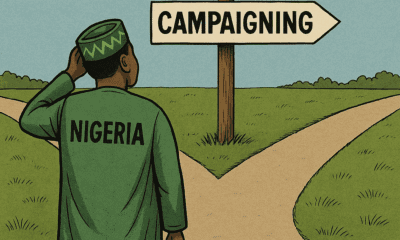Economic Issues
In the Policy World, Data is the New Greenery -By Dovish Okojie
If Nigeria is serious about progress, then it must embrace data as greenery. We cannot continue to govern by guesswork, assumptions, and political convenience. A nation of over 200 million people cannot afford policies built on estimates.

In every epoch of human development, certain resources rise to prominence as the engine of progress. In the agrarian age, it was fertile land. In the industrial era, it was coal and steel. In the information age, it was knowledge. But in today’s world, what many thinkers have called the Data Age, the resource that powers societies, economies, and governments is no longer just land, oil, or machinery. It is data.
Data is the new greenery. It is the fresh oxygen that allows policy to breathe, expand, and flourish. Just as lush greenery provides life, shade, and sustenance, data offers clarity, direction, and precision in governance. In the policy world, data is not just a resource; it is the greenery that cools the heat of uncertainty, nourishes the soil of decision-making, and allows the fruits of development to ripen.
The embrace of accurate, timely, and comprehensive data could be the turning point for Nigeria in our search for working solutions to our peculiar challenges. The absence of reliable data has often led to blind decision-making and policies that look good on paper but fail to impact lives meaningfully. If we must chart a new course toward inclusive growth, stability, and sustainable development, we must water our policy landscape with data.
Why Data Is the New Greenery in Policy
Data as Nourishment for Policy: Just as greenery sustains ecosystems, data sustains policymaking. A government that operates without data is like a farmer who sows seeds without knowing the seasons or soil conditions. Policies built on assumptions rather than evidence will struggle to take root. Data provides nourishment through facts, figures, patterns, and projections that ensures policies grow strong and resilient.
Data as Shade in the Desert of Uncertainty: Policymaking, especially in developing nations, is plagued by uncertainties: fluctuating oil prices, global economic shocks, demographic shifts, and climate crises. Data provides shade in this desert. When leaders/nations have access to robust statistics, predictive models, and feedback loops, they are shielded from making rash, reactive, or short-sighted decisions.
Data as Growth and Renewal: Greenery regenerates and reproduces; so too does data. Every survey, census, or administrative record creates new insights, which in turn trigger innovation in policy. The renewable power of data lies in its ability to evolve, grow, and create cycles of better governance.
Nigeria’s Policy Landscape: A Garden in Need of Greenery
Nigeria’s policy landscape, though fertile, is often dry and undernourished. Let’s consider the following realities:
Population Data: Nigeria has not had an accurate census since 2006. Projections say we are over 220 million, but no one knows for sure. How do we plan sufficiently for healthcare, education, or housing without knowing the exact number of our citizens?
Employment Data: Unemployment and underemployment figures are often outdated, inconsistent, or contested. Without precise data, youth empowerment programs become shots in the dark.
Agricultural Data: Farmers grow crops without access to reliable market data, leading to gluts in some commodities and shortages in others. Policies to ensure food security suffer because we do not know what is planted, harvested, or wasted.
Health Data: Nigeria’s health sector still relies heavily on estimates. The COVID-19 pandemic revealed how fragile our data systems were, with conflicting figures undermining trust and effective planning.
Economic Data: Informal sector activities where over 80% of Nigerians work remain poorly captured, leaving policies skewed toward the formal economy.
This lack of accurate data has meant that policies are often driven by political considerations, short-term optics, or donor pressure rather than by evidence. We shouldn’t be like a farmer trying to plant in barren land, while ignoring the lush greenery that data could provide.
What Happens When Policies Lack Data
The dangers of policymaking without data are include:
Misallocation of Resources: Budgets get inflated for areas that don’t need them while starving urgent sectors.
Policy Failures: Well-intentioned initiatives collapse because they are designed on false assumptions. For instance, a loan scheme for small businesses can fail because the real number of SMEs is unknown.
Corruption and Leakages: In the absence of reliable data, ghost workers thrive, subsidies are misdirected, and funds vanish without trace.
Erosion of Trust: Citizens lose faith in government when policies fail repeatedly. Trust, once broken, is hard to regain.
The greenery of data could have prevented many of these failures. Just as accurate rainfall patterns help farmers prepare, accurate data helps governments anticipate, plan, and deliver.
Data as the Seed of Transformation
For our beloved Nigeria, seeing data as greenery is not just a metaphor; it is a survival strategy. With a fast-growing population, rapid urbanization, climate threats, and economic vulnerabilities, the future will punish guesswork but reward precision.
What Nigeria Must Do
Conduct a Credible National Census: Nigeria cannot move forward without knowing how many we are, where we live, and what we do. A credible census, updated regularly, is the root of data greenery.
Strengthen Administrative Data Systems: Births, deaths, taxes, employment records are the natural streams of data every nation must capture. Nigeria must digitize and centralize administrative records to ensure reliability.
Build Data Literacy and Capacity: It is not enough to collect data; policymakers must learn to read, interpret, and apply it. Universities, civil service training schools, and think tanks should mainstream data literacy.
Leverage Technology and Big Data: Mobile phones, fintech platforms, satellite imagery, and AI can help Nigeria capture real-time insights. For example, satellite data can monitor agricultural output, while fintech data can measure informal sector activity.
Promote Open Data and Transparency: Data should not be locked away in government silos. Citizens, businesses, and researchers should have access to non-sensitive datasets. Transparency builds trust and encourages innovation.
Institutionalize Evidence-Based Policymaking: Every policy must pass the test of evidence: What does the data say? What will success look like, and how will it be measured? Without this discipline, policies remain rhetoric.
Why Accurate Data Matters for Nigeria’s Progress
- Economic Growth: Accurate economic data allows for targeted interventions. For example, knowing the exact size of Nigeria’s informal economy can guide taxation and credit policies.
- Healthcare: Accurate disease surveillance can prevent epidemics and guide vaccine distribution.
- Education: Data on school-age children helps plan curricula, teacher training, and school infrastructure.
- Security: Reliable demographic and geospatial data help track crime, terrorism, and migration patterns.
- Infrastructure: Data-driven urban planning prevents chaotic settlements, traffic gridlocks, and slum proliferation.
- Climate Action: Accurate weather and environmental data can guide climate adaptation and disaster management.
In short, accurate data allows Nigeria to govern with precision, not approximation. It ensures that policies are not just broad strokes but targeted arrows that hit their mark.
Challenges to Cultivating the Data Greenery in Nigeria
- Political Will: Leaders often fear data because it exposes truths that are politically inconvenient.
- Institutional Weakness: Data agencies are underfunded and politicized.
- Technology Gaps: Many records are still paper-based, making integration difficult.
- Mistrust: Citizens often distrust government data, seeing it as manipulated or inflated.
- Cost: Large-scale data collection like censuses requires billions of naira.
Yet, every garden has weeds. The solution is not to abandon the garden but to weed it with persistence and care.
A Call to Water the Greenery
If Nigeria is serious about progress, then it must embrace data as greenery. We cannot continue to govern by guesswork, assumptions, and political convenience. A nation of over 200 million people cannot afford policies built on estimates.
The future belongs to data-driven societies. Countries that cultivate this greenery will enjoy shade in hard times, nourishment in lean times, and fruits in abundance. Those that ignore it will wander in deserts of uncertainty, policy failure, and public disillusionment.
Accurate data is not a luxury for Nigeria; it is an existential necessity. It is the bridge between our vast potential and our lived reality. It is the greenery that will transform barren policy deserts into flourishing landscapes of progress.
In the policy world, data is indeed the new greenery. It is time for Nigeria to water its future with it.
Dovish Okojie is an Economic Researcher, Management Consultant and Public Affairs Analyst. He writes from Abuja and can be reached through dovishokojie@gmail.com










